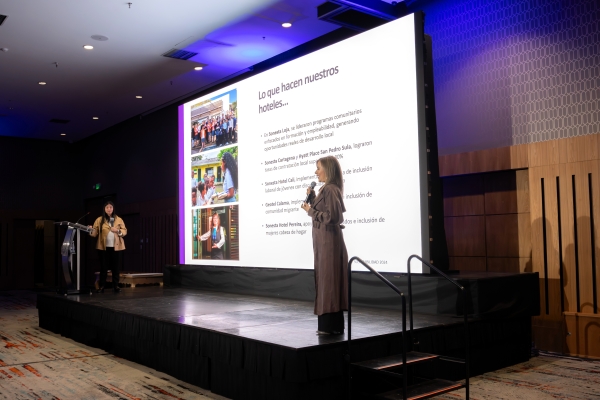BOGOTA, Colombia—GHL Hoteles wants to be the most eco-friendly lodging company in Latin America. Its first sustainability report is a step in the right direction.
The Colombia-based company announced during a press conference here at the Sheraton Bogota Hotel that 100% of its hotel operations have been certified under ISO 20141, ISO 45001 and GMP (Good Manufacturing Practices) standards by the International Organization for Standardization, covering 57 of its managed hotels.
GHL operates 64 hotels across nine Latin American countries, spanning the luxury, lifestyle, premium, economy and leisure segments. These properties operate under GHL’s own brands, as well as independent and international brands.

Starting point
“The concept of sustainability has changed,” said Andrés Fajardo, CEO of GHL Hoteles. “It was something we had to do; not something we actually wanted to pursue. Now, it’s about how people feel within our company and how they experience our social responsibility to build a better planet for everyone.”
According to Sandra Zapata, head of HR for GHL, the company has spent the last 13 years refining its sustainability practices. As a foundation, the company established four strategic pillars:
- Climate Action: Focused on minimizing environmental footprint by reducing (or alternatively offsetting) the average carbon footprint per installed room by 15% by 2030, as well as advancing toward its 2035 carbon neutrality goal, which includes a 34.5% cumulative reduction in emissions and major decreases in water (-15%), energy (-30%) and waste (-50%) consumption.
In addition, the company aims to maintain the acquired ISO certifications for at least 3 years and achieve recertification for all operations every three years.
In terms of suppliers, GHL aims to promote a responsible supply chain with products and services aligned with concerns about climate change, deforestation, human rights, waste, public health, resource scarcity, biodiversity and animal welfare.
- Education for All: To train and develop the skills of family members of 20% of its employees, as well as the skills of 390 members of the communities where it operates on a global scale. In addition, GHL aims to incorporate an accessible and inclusive online education platform designed to positively impact more local communities, with a special focus on vulnerable and minority groups, expanding its reach and training an average of 1,000 people per year.
- Responsible Tourism: Through its GHL Training School, the company aims to train 1,000 people annually, empowering employees, families and local communities on human rights, responsible supply chains and recruitment policies. One of its goals is for the Head Office to be certified with good practices in transparency and business ethics between 2025 and 2027.
- Diversity and Inclusion: During the second half of 2025, to design and implement a Pay Equity and Inclusion Policy that addresses gender, race and sexual orientation equity, ensuring objective and non-discriminatory criteria for equivalent roles; in addition, to establish an annual review and update process for pay bands to monitor and maintain such equity, as well as achieving 100% pay parity between men and women in equivalent roles by 2030.

2024 general achievements
GHL announced significant progress in its sustainability strategy, reporting a 6.18% reduction in its carbon footprint in 2024, achieving 20.63 kg CO₂e per occupied room. Key initiatives include installing solar panels across multiple properties, eliminating single-use plastics, transitioning to LED lighting and implementing water reuse systems.
Environmental programs have also expanded to protect biodiversity, with the planting of over 6,000 trees, reforestation efforts and partnerships with organizations such as Fundación Palmarito in Casanare, Colombia, and Saving the Amazon. Energy efficiency measures, including renewable generation and smart technology adoption, contributed to a 3.41% decrease in energy use per guest and a 5.74% reduction in overall water consumption.
On the social front, GHL strengthened inclusion and development programs, achieving a gender pay gap below 5% and promoting the hiring of people with disabilities, migrants and women heads of households.

The stars of the show
During the conference, almost all teams from the different managed properties were connected on a Zoom call, eagerly waiting for the name of their hotels to be called out. Some of them received special recognitions, which include:
-
AIM2Flourish Award from Case Western Reserve University to BIOHOTEL Organic Suites in Bogota for its contribution to the UN Sustainable Development Goals.
-
SERNATUR Chile S Seal awarded to Geotel Antofagasta in Chile for sustainable tourism practices.
-
Gold Seal from Peru’s Ministry of Foreign Trade and Tourism to GHL Lago Titicaca in Peru for best hospitality practices.
-
Integrating Companies Award by Pan American Development Foundation (PADF), the German Society for International Cooperation (GIZ), the United Nations High Commissioner for Refugees (UNHCR), the United States Agency for International Development (USAID) and the EU to Sonesta Posadas del Inca Puno in Peru for advancing socioeconomic inclusion.
-
Additional recognitions for sustainability, inclusion and service excellence to properties such as Sonesta Osorno, Mercure Miraflores, Sonesta Valle Sagrado and Hyatt Centric Guatemala & El Salvador.
The group also engaged in over 10 environmental and social initiatives across Latin America, including beach cleanups, reforestation, health brigades, inclusive employment fairs and educational programs.
Towards the end, Zapata concluded with what was, more than an inspiring phrase, the ethos that the company’s leaders seem to share. “For sustainability to be effective, people have to really feel that it is important, that it matters in every little aspect of their lives. Otherwise, it is just another management system”.

